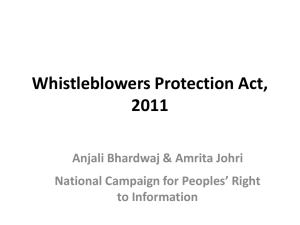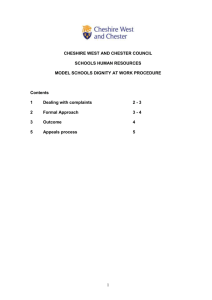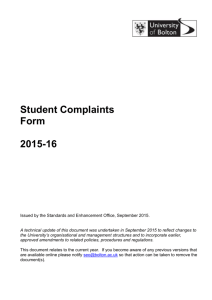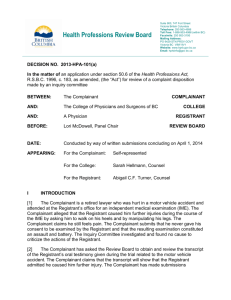2014-HPA-101(a) - Health Professions Review Board
advertisement
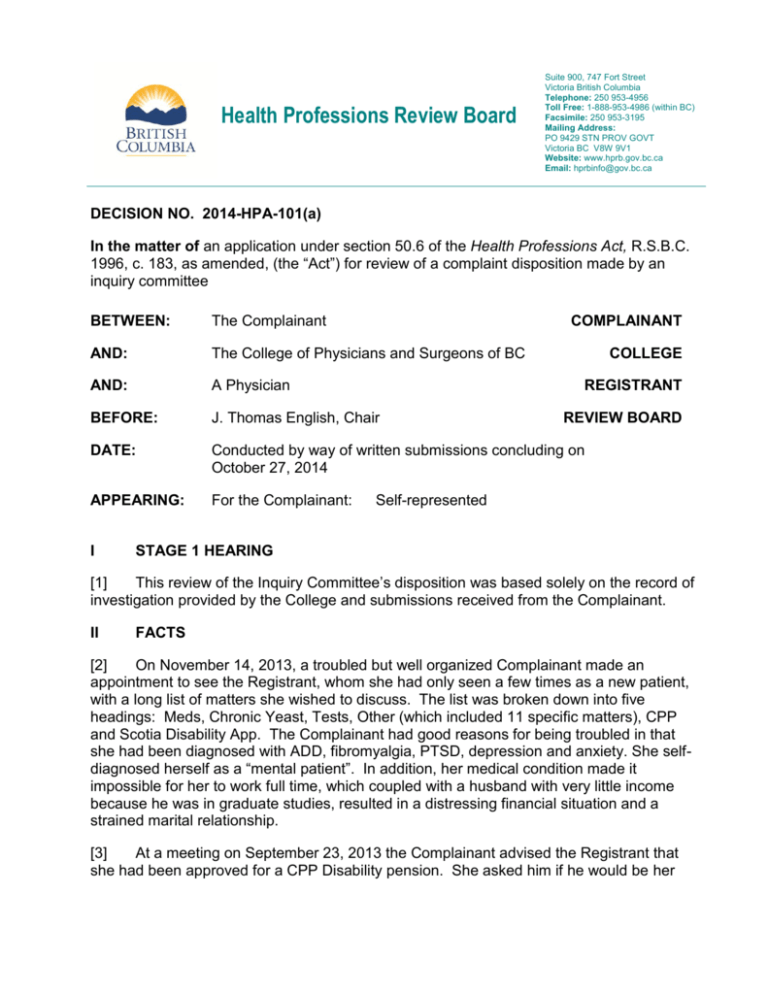
Health Professions Review Board Suite 900, 747 Fort Street Victoria British Columbia Telephone: 250 953-4956 Toll Free: 1-888-953-4986 (within BC) Facsimile: 250 953-3195 Mailing Address: PO 9429 STN PROV GOVT Victoria BC V8W 9V1 Website: www.hprb.gov.bc.ca Email: hprbinfo@gov.bc.ca DECISION NO. 2014-HPA-101(a) In the matter of an application under section 50.6 of the Health Professions Act, R.S.B.C. 1996, c. 183, as amended, (the “Act”) for review of a complaint disposition made by an inquiry committee BETWEEN: The Complainant AND: The College of Physicians and Surgeons of BC AND: A Physician BEFORE: J. Thomas English, Chair DATE: Conducted by way of written submissions concluding on October 27, 2014 APPEARING: For the Complainant: I COMPLAINANT COLLEGE REGISTRANT REVIEW BOARD Self-represented STAGE 1 HEARING [1] This review of the Inquiry Committee’s disposition was based solely on the record of investigation provided by the College and submissions received from the Complainant. II FACTS [2] On November 14, 2013, a troubled but well organized Complainant made an appointment to see the Registrant, whom she had only seen a few times as a new patient, with a long list of matters she wished to discuss. The list was broken down into five headings: Meds, Chronic Yeast, Tests, Other (which included 11 specific matters), CPP and Scotia Disability App. The Complainant had good reasons for being troubled in that she had been diagnosed with ADD, fibromyalgia, PTSD, depression and anxiety. She selfdiagnosed herself as a “mental patient”. In addition, her medical condition made it impossible for her to work full time, which coupled with a husband with very little income because he was in graduate studies, resulted in a distressing financial situation and a strained marital relationship. [3] At a meeting on September 23, 2013 the Complainant advised the Registrant that she had been approved for a CPP Disability pension. She asked him if he would be her DECISION NO. 2014-HPA-101(a) Page 2 main go-to-person and quarterback when dealing with CPP. The Registrant did not agree to so act as he said needed to know more about the application and its history. [4] At the November 14, 2013 medical appointment, although the CPP item because of its financial implications was the most important matter to the Complainant, she elected to go through the list specified in paragraph [2] above. When they got to the CPP matter the allotted time for the appointment had run out and the Registrant said they had to book another appointment. At this point, the Complainant said the CPP matter was very important and time sensitive and asked the Registrant to call a Dr. A, her psychiatrist, to discuss the CPP matter which the Registrant declined to do because he had other patients to see. Apparently he said “I don’t have the time to be on the phone all day for you.” [5] At this point, the Complainant became quite anxious and pressed for an appointment as soon as possible. Words were exchanged that led to the Registrant suggesting that perhaps she should start looking for a new family doctor and that he was not going to find one for her. The Complainant interpreted this comment to mean that he had fired her and she wanted this firing confirmation in writing. [6] As recounted in the College’s disposition letter – the factual accuracy of which was not disputed by the Complainant - the Complainant became quite agitated and complained of how difficult it was to arrange an appointment and that he should pay his staff more. This outbreak carried on into the reception area where in a loud voice she called the Registrant “an asshole” (the complainant’s own admission, as quoted by the Inquiry Committee) and demanded that he give her a letter stating that he had fired her. III SUBMISSIONS OF THE COMPLAINANT [7] The Complainant submitted that the Registrant was guilty of unprofessional conduct and the inappropriate ending of a patient-physician relationship. [8] As her husband had found a position in a new city the Complainant requested that the College find her a new family physician. IV DISPOSITION OF THE COLLEGE [9] As to the accusations against the Registrant, the College was not critical of his professionalism and found no support in the record that he had terminated the professional relationship. [10] As to finding her a new physician, the College stated they had no jurisdiction to direct patient care and thus were unable to assist her in finding a new family physician. V APPLICABLE LAW AND PRINCIPLES [11] My mandate to review Inquiry Committee decisions is governed and limited by the Act. Section 50.6(5) of the Act states: DECISION NO. 2014-HPA-101(a) Page 3 On receipt of an application under subsection (1) the review board must conduct a review of the disposition and must consider one or both of the following: (a) the adequacy of the investigation conducted respecting the complaint; (b) the reasonableness of the disposition. Adequacy of the Investigation [12] The Review Board has determined in prior decisions that not all complaints will require a College to pursue every possible avenue of investigation, but a Complainant is entitled to an adequate investigation. [13] The standard I have adopted for assessing the adequacy of investigation, in this matter is whether this complaint was investigated diligently, considering its seriousness, complexity and the availability of evidence. The law applying to the adequacy of an investigation was properly determined in the Review Board Decision No. 2009-HPA0001(a)-000(4)(a) at paragraphs [97] and [98]: [97] A Complainant is not entitled to a perfect investigation, but he or she is entitled to adequate investigation. Whether an investigation is adequate will depend on the facts. An investigation does not need to have been exhaustive in order to be adequate, provided that reasonable steps were taken to obtain key information that would have affected the Inquiry Committee’s assessment of the complaint. [98] The degree of diligence expected of the College – what degree of investigation was adequate in the circumstances – may well vary from complaint to complaint. Factors such as the nature of the complaint, the seriousness of the harm alleged, the complexity of the investigation, the availability of evidence and the resources available to the college will all be relevant factors in determining whether an investigation was adequate in the circumstances. [14] The role of the Review Board in assessing the adequacy of an investigation is to determine whether the Inquiry Committee’s investigation provided it with sufficient information to assess the particular complaints made against the Registrants. It is not the role of the Review Board to reinvestigate the complaint or to substitute its decision for that of the Inquiry Committee. Reasonableness of the Disposition [15] The legislature’s reference to the “reasonableness of the disposition” makes clear that the Review Board is not to ignore what the Inquiry Committee has done or to step into its shoes. On the other hand, by conferring the review mandate on a specialized Review Board rather that a generalist court as it could have done, the legislature must equally have recognized firstly that it is for the Review Board to determine the degree of deference that is appropriate in particular circumstances, and secondly that reasonableness is not selfapplying; that the Review Board is not a court and that the application of the reasonableness test will necessarily reflect the Review Board’s specialized role and expertise. The legislature has made clear that it falls within the Review Board’s exclusive DECISION NO. 2014-HPA-101(a) Page 4 jurisdiction to define and apply “reasonableness” within the context of reforms whose purpose is to ensure an appropriate degree of college accountability, s. 50.63(1). [16] The test the Review Board has traditionally applied to determine reasonableness is whether the Inquiry Committee’s disposition “falls within the range of acceptable and rational solutions, and is, viewed in the context of the whole record, sufficiently justified, transparent and intelligible to be sustained.” I see no basis to depart from this view. I only note that the “range of acceptable and rational solutions” and what is “sufficient” justification, transparency and intelligibility in a particular case is a question to be determined by the Review Board on a case by case basis, applying its expertise and specialized role in good faith, and not simply by comparison to how a generalist court might apply the test on judicial review. [17] The Review Board is not to decide whether the Inquiry Committee’s decision was right or wrong, and administrative law does not require that the disposition be one that the Review Board would have made. Rather, as mentioned above it must be a disposition that is supported by the evidence from the investigation, and one that fits within the range of acceptable and rationale outcomes. VI STAGE 1 OR STAGE 2 [18] This complaint has been referred to a Stage 1 hearing. At this stage the following results are possible: (a) I may confirm the Inquiry Committee disposition under s. 50.6(8)(a) of the Act if the application for review can be fairly, properly and finally adjudicated on the merits without the need for submissions from the College and Registrant; or (b) I may determine that the application requires adjudication in a Stage 2 hearing, in which case no decision will be made until after requesting submissions from the College and Registrant, and further reply submissions from the Complainant. VII ANALYSIS Adequacy of the Investigation [19] The College provided the Inquiry Committee with a detailed description of her complaint which was forwarded to the Registrant for response. The Registrant responded and included all his medical records and other documents in his possession relative to the complaint and the statements of two medical office assistants who witnessed the scene described in paragraph [6] above. These documents were forwarded to the Complainant for a reply which she did. [20] As all of the relevant evidence was examined I find there was an adequate investigation. DECISION NO. 2014-HPA-101(a) Page 5 Reasonableness of the Disposition [21] There is no question the Complainant is sincere in her belief in her submissions to support her claim. However, the evidence in the record supports the College’s view that the physician did not terminate the doctor-patient relationship or otherwise conduct himself inappropriately or unprofessionally. Rather, it appears that the assertions of the Complainant are based on unfounded conclusions drawn from the Registrant’s refusal to assist her in the manner and timeframe that she desired. It is unfortunate that at the session on November 14, 2013 the Complainant did not raise the CPP matter at the very beginning; that may have made a difference. [22] Based on the material in the record before me, the Inquiry Committee’s disposition falls within the range of acceptable and rational solutions and is sufficiently justified, transparent and intelligible to be sustained. [23] As a result of the foregoing analysis I find there was a reasonable disposition. VIII CONCLUSION [24] The Inquiry Committee availed itself of the key information on which to base its disposition. It fulfilled its duty to investigate the complaint adequately. Similarly it has delivered a reasonable disposition. [25] I find that this application for review can be fairly, properly and finally adjudicated on the merits without the need for submissions from the College or Registrant. The decision of the Inquiry Committee to dispose of the complaint is supported by its analysis of the evidence. For the reasons outlined above I dismiss the application for review and confirm the disposition of the Inquiry Committee. [26] In making this decision I have considered all of the information and submissions before me whether or not I have specifically referenced them. “J. Thomas English” J. Thomas English, Q.C., Chair Health Professions Review Board December 23, 2014
